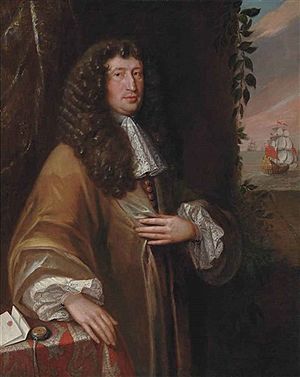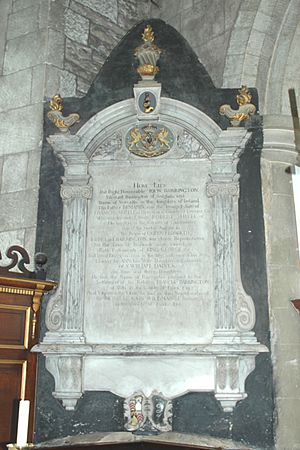John Barrington, 1st Viscount Barrington facts for kids
John Barrington, 1st Viscount Barrington (born in 1678 – died December 14, 1734), was an important English thinker and politician. Before 1710, he was known as John Shute. He was a Dissenter (someone who didn't follow the official Church of England) and a Whig politician. He served in the British House of Commons (like a parliament) from 1715 to 1723.
Contents
Early Life and Education
John Barrington was born as John Shute at Theobalds House in Cheshunt, Hertfordshire. His father, Benjamin Shute, was a merchant, and his mother was Elizabeth.
He studied at the University of Utrecht in the Netherlands from 1694 to 1698. After returning to England, he also studied law at the Inner Temple.
A Career in Politics
John Barrington was a Dissenter, meaning he was a Protestant who was not part of the Church of England. In 1701, he wrote several pamphlets supporting the civil rights of other Protestant dissenters.
A powerful person named Lord Somers recommended him for a special job. John Barrington was asked to encourage Presbyterians in Scotland to support the union of England and Scotland. This union created Great Britain.
In 1708, he was rewarded for his work by becoming a commissioner of customs. This meant he helped manage taxes on goods coming into the country. However, he lost this job in 1711 when the government changed.
Around this time, he inherited two large estates. One was from a distant relative, Francis Barrington, and John took the name Barrington in 1710. The other was from an admirer, John Wildman. John Barrington became one of the most important Dissenters of his time.
Serving in Parliament
In the 1715 British general election, John Barrington was elected to Parliament for Berwick-upon-Tweed. He was elected without anyone running against him, alongside another Dissenter, Grey Neville.
In 1720, the King gave him a special honor. He was made an Irish peer, becoming Baron Barrington and Viscount Barrington. This meant he had noble titles in Ireland.
He was re-elected as an MP for Berwick in the 1722 British general election.
The Harburg Lottery Issue
John Barrington became a leader in the Harburg Company. This company aimed to trade between Great Britain and Hanover (a German state). The company wanted to raise money by holding a lottery.
Barrington's job was to get Parliament's permission to hold this lottery in England. Even though some people, like Robert Walpole, warned him it was against the law, the lottery went ahead.
A special committee in Parliament investigated the lottery. They found that Barrington had been involved in "promoting... a fraudulent undertaking." This meant the lottery was seen as a dishonest business deal.
As a result, he was removed from the House of Commons in 1723. Some people felt this punishment was too harsh. They thought it might have been because Robert Walpole disliked him.
Later Years and Writings
After leaving Parliament, John Barrington continued his work. In 1725, he published his main work, called Miscellanea Sacra. This book looked at the history of the Apostles in the Bible. His son, Shute Barrington, later republished it with updates. In the same year, he also published An Essay on the Several Dispensations of God to Mankind.
Barrington tried to get back into Parliament. He ran again for Berwick in the 1727 British general election but lost. He was very hopeful about winning the 1734 British general election. However, Robert Walpole worked against him, and he lost by just four votes.
Death and Family Legacy
John Barrington passed away on December 14, 1734. He had married Anne Daines in 1713. Their five sons all became very successful and well-known:
- William, the oldest, became a very important financial minister.
- John became a Major-General in the British Army.
- Daines was a lawyer, historian, and naturalist.
- Samuel became a Rear-Admiral in the Royal Navy.
- Shute became a Bishop of Salisbury and later a Bishop of Durham.
Their daughter Anne married Thomas Clarges.



